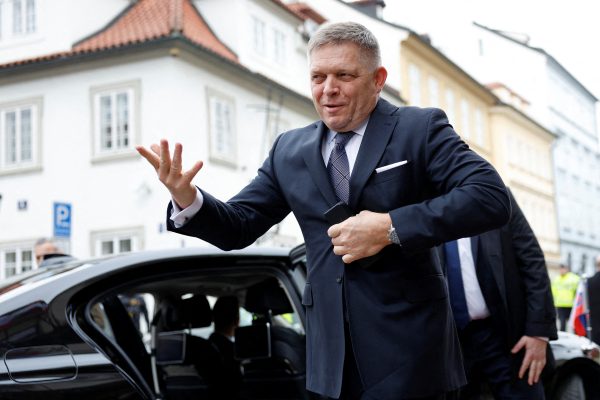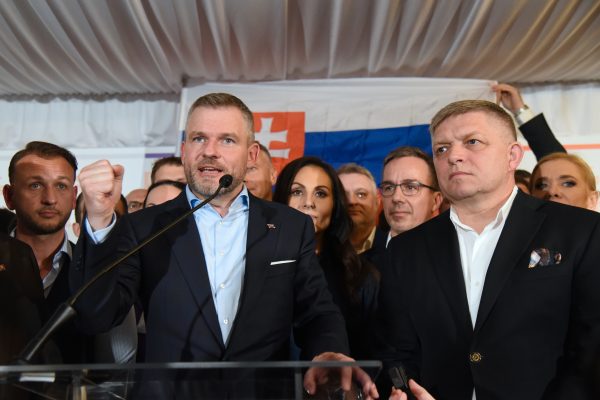A breakthrough seems to have ended Bulgaria’s long-running political crisis after the center-right Citizens for European Development of Bulgaria (GERB) and the reformist coalition of We Continue the Change-Democratic Bulgaria (PP-DB) agreed to share power.
Bulgaria’s two main political factions reached the deal on May 22 deal after GERB nominated former EU commissioner Mariya Gabriel as its candidate for prime minister. The other parties had previously refused to enter talks with Boyko Borisov, the former prime minister and communist-era Interior Ministry official, who led GERB in April’s inconclusive elections, after widespread allegations of corruption against his government and mass protests in 2020-2021.
Under the new rotating premiership, Gabriel, who is set to become Bulgaria’s first female prime minister, will take over from the PP-DB’s Nikolai Denkov after nine months. The potential return of stable government increases the prospect of Bulgaria joining the European Union’s (EU) borderless Schengen Area and single currency after two years of deadlock and five elections that had until now failed to break the political stalemate.
The crisis began after Kiril Petkov’s We Continue the Change ended GERB’s long run of power in a 2021 election, riding the wave of protests against high-level corruption and control of the state by an oligarchic mafia. The resulting coalition only lasted six months before it collapsed when one of its partners, the populist There is Such a People party, withdrew its support over a decision to lift Bulgaria’s veto of North Macedonia’s EU accession talks. Successive attempts to form a new government then failed.
The protracted impasse only served to benefit Russia. It frustrated Bulgaria’s implementation of reforms needed for Schengen and Eurozone accession and strengthened pro-Russian sentiment among sections of the electorate. The pro-Kremlin Revival Party finished third in the election in April behind GERB (25.4%) and the PP-DB (23.5%), on the back of growing disillusionment with the political leadership, taking 13.5% of votes.
The crisis only deepened after Revival refused to enter a coalition with the other parties. This forced Bulgaria into a caretaker government nominated by its president, Rumen Radev, who has in the past made sympathetic remarks about Russia.
The new power-sharing deal wrests control back from the president and should give Bulgaria a chance to reset programs of reform and return to its European path. But there may be trouble ahead, not least the possibility that PP-DB’s decision to enter government with GERB could damage its credibility with voters as a genuine reformist coalition.
Kiril Petkov has said that the deal agreed upon is not a formal coalition, but a rotational premiership, and a precedent for such a model of governance exists elsewhere in southeastern Europe. Romania, Bulgaria’s northern neighbor, is a prime example. The experience there suggests PP-DB might be rewarded at the ballot box for ending a period of political uncertainty at a time when Bulgaria faces the challenges of recovery from the Covid-19 pandemic and war in the region.
Whatever the electoral prospects for the reformist coalition, the new agreement will help to shore up Bulgaria’s constitutional processes. The resumption of normal government business in Sofia will alleviate the growing concern that President Radev had overstepped his powers under Bulgaria’s system, in which executive authority lies primarily with the government.
In a move opponents described as unconstitutional, Radev took control of foreign policy and positioned Bulgaria as an outlier in the EU response to Russia’s war of aggression against Ukraine. With the return of an elected administration, the new government is in a position to reassert constitutional principles and reverse the creeping powers of its head of state.
The end to the political deadlock also means that Revival may find it harder to sustain its newly acquired popular support. Despite some deeply-entrenched pro-Russian sentiment in Bulgaria, an increasing number of voters hold a negative view of Russia after the full-scale invasion. An Alpha Research poll conducted in April found 63% of Bulgarians supported the EU and NATO while only 15% favored stronger ties with Russia. These findings suggest that containing the rise of Revival is possible if the pro-European government delivers political stability.
The political uncertainty in Bulgaria cannot be addressed with a single agreement alone, and the success of the power-sharing arrangement will be judged on whether it can make substantial progress on reform while maintaining the confidence of MPs. While Gabriel’s European credentials are clear, some in the PP-DB, like Daniel Laurer, a senior figure, said his party remains distrustful of GERB.
A lot is at stake for both GERB and PP-DB and their promise of ridding Bulgaria of corruption and cementing its place in Europe. At the very least, both sides are willing to work together for a Bulgaria weary at the lack of action on the crises it faces, and that’s a crucial first step.
Hugo Blewett-Mundy is a commentator and consultant. He holds an MA in Russian and Post-Soviet Politics from the UCL School of Slavonic and East European Studies and writes about current affairs in Central and Eastern Europe.
Europe’s Edge is CEPA’s online journal covering critical topics on the foreign policy docket across Europe and North America. All opinions are those of the author and do not necessarily represent the position or views of the institutions they represent or the Center for European Policy Analysis.





